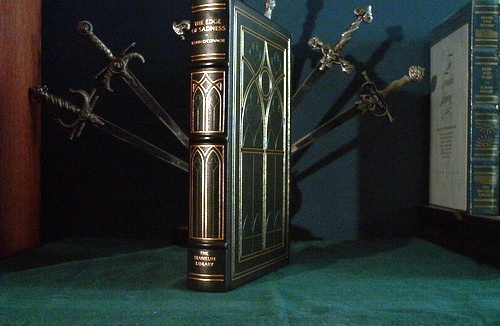Franklin Library Edwin O'Connor books
The Edge of Sadness - Library of Pulitzer Prize Classics - 1978
Edwin O'Connor biography
Edwin O'Connor, born on July 29, 1918, in Providence, Rhode Island, was an esteemed American novelist and journalist known for his insightful exploration of Irish-American identity and the complexities of human nature. His works, characterized by their richly drawn characters and nuanced storytelling, have earned him critical acclaim and a lasting place in American literature. Raised in an Irish-American Catholic family, O'Connor's heritage deeply influenced his writing from an early age. After attending Boston College, where he honed his skills as a writer and journalist, he embarked on a career in newspaper reporting, working for publications such as the Boston Herald and the Worcester Telegram.
O'Connor's literary breakthrough came with the publication of his novel The Last Hurrah (1956), a sprawling epic set in the fictionalized Boston neighborhood of "Frank Skeffington." Drawing inspiration from the colorful characters and political machinations of Boston's real-life political landscape, the novel offers a searing portrayal of power, ambition, and the clash between old and new values in American society. The Last Hurrah became an instant bestseller and was later adapted into a successful film starring Spencer Tracy. Following the success of The Last Hurrah, O'Connor continued to explore themes of identity, morality, and the immigrant experience in his subsequent novels. Works such as The Edge of Sadness (1961), which won the Pulitzer Prize for Fiction, and The Congressman Who Loved Flaubert (1962) further solidified his reputation as a master storyteller with a keen understanding of the human condition.
In addition to his novels, O'Connor wrote essays, short stories, and screenplays, showcasing his versatility as a writer. His keen observations of human behavior and his ability to capture the essence of Irish-American life earned him widespread praise from critics and readers alike.
Despite his literary success, O'Connor remained humble and grounded, often shying away from the spotlight. He continued to write and work as a journalist, maintaining a deep commitment to his craft until his death on March 24, 1968, in Boston, Massachusetts. Edwin O'Connor's contributions to American literature endure as a testament to the power of storytelling to illuminate the human experience and provoke thought and reflection. His novels continue to resonate with readers for their timeless themes and universal truths, ensuring his legacy as one of the preeminent voices in 20th-century American literature.

Comments
Post a Comment
Share your best book review and recommendation